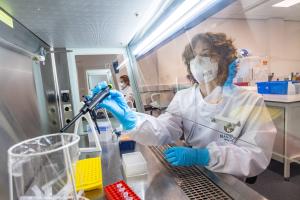Call to improve emergency care for Deaf community in Wales
Experts in Wales and Austria are calling for improved access to health and emergency services for Deaf people.
The health emergency services are a critical aspect of any healthcare system and should be available and accessible to all.
In an emergency, Deaf people whose first language is British Sign Language (BSL) often find themselves unable to properly communicate, either in person or via the 999 text messaging system. This leaves their health and very survival at risk.
A recent review conducted for Public Health Wales by linguists at Bangor University and the University of Graz, Austria, and published in Frontiers in Communication highlights how and why the Deaf community are being failed. The review can be read here.
Though no official census figures exist, there are an estimated 1,000 to 4,000 Deaf people living in Wales according to (BDA, 2019; Sign Health, Action on Hearing Loss, 2020)
Bangor University linguistics experts Dr Christopher Shank and Dr Anouschka Foltz (now at University of Graz, Austria) sought the experiences and views of members of Wales’ British Sign Language using Deaf community.
Responding to their findings, they call on the Welsh Government to vastly increase the numbers of BSL interpreters to be available within healthcare, and especially in emergency settings.
They suggest that improving access to services should be viewed from the perspective of the potential savings that improving access to healthcare and removing inequalities would bring.
“The lack of available interpreters for health appointments often leads to members of the Deaf community experiencing poorer health outcomes than the general public and this can lead to more health emergencies.
Michelle Fowler-Powe, Access and Inclusion (Advocacy) Coordinator, Community Development, British Deaf Association explained:
“Despite being the sole language of many in the Deaf community in Wales, BSL has no legal status as a language. BSL is described as communication support within NHS Wales Guidelines, while it really should receive the same status as Welsh as a ‘core component of care, not an optional extra’.”
Dr Christopher Shank explained:
“Our report highlights time and again, how Deaf people in a critical situation, such as using the 999 text system, are asked to text or communicate detailed medical descriptions in English- often an unfamiliar language to them. They are often asked to be precise or use a vocabulary which they don’t have.”
Dr Anouschka Foltz added:
“Deaf patients are repeatedly encountering barriers in accessing health care. The resulting ‘barrier fatigue’ can result in low expectations and anxiety at the prospect of engaging with the service. Those barriers would not exist if all healthcare services were provided in BSL either through an interpreter or native-signing staff.”
Louise McGrath of the Wales Council for Deaf People commented:
“Overall the standard of care received by Deaf people who use Sign Language as their first language is greatly affected due to this being looked upon as a medical need. It is not. It is a cultural and linguistic language right, not to mention a human right to communicate in BSL.
Until BSL has equal rights, as Welsh language has here in Wales, we fear that changes will be slow. BSL was recognised as a language on 18th March 2003 by the UK government, however, over 17 years later, it still has no legal protection. We feel that if this were to happen, then action can be taken and people will not be sidelined where their health is concerned and can have equal input into their own care.”




